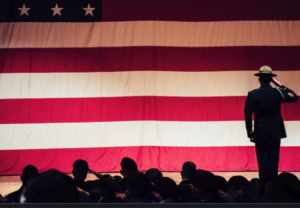Political Boot Camp for Veterans

By Debbie Gregory.
Did you know that thirty-one out of forty-five United States Presidents have served in the Armed Forces? An unprecedented number of veterans who served in Afghanistan and Iraq are seeking state and federal elected offices. While the number of United States senators with war experience in both conflicts will be relatively the same, a surge has taken place for both parties in the United States House of Representatives.
Both political parties have encouraged veterans to run for Congress. As the number of military personnel serving in Afghanistan and Iraq decreases, more veterans are funning for office because they want to continue to serve their country. Additionally, efforts to recruit, train and support veteran candidates has moved from ad hoc initiatives to more formalized support.
Veterans are very attractive candidates to voters as well. They tend to be more pragmatic and their military experience of mission accomplishment, teamwork, service above self, and nation over faction appeal to voters tired of constant bickering in Washington, D.C.
If you’re a veteran looking to run for a political office, you may have found the barriers of entry to be incredibly high. But there is hope on the horizon.
In part made possible by a grant from JP Morgan Chase & Co., Syracuse University’s Institute for Veterans and Military Families (IVMF) and the Maxwell School are collaborating to introduce a new and innovative program for veterans and military family members who aspire to public office or another form of a political career.
The goal of the “Veterans in Politics” (VIP) program is to act on the opportunity to continue public service demonstrated by those who have served in our nation’s military.
“The IVMF’s deep involvement, understanding and engagement with the veteran and military-connected community, coupled with the Maxwell School’s standing as the nation’s No. 1 ranked school of public affairs, positions this program to empower those who have served our nation in uniform with preparation, expertise and confidence so that they can extend their commitment to public service in the form of a political career at the local, state or federal level,” said David M. Van Slyke, Dean of the Maxwell School
The VIP program will enroll its inaugural class in late 2019. The program will feature both online coursework and a one-week intensive residency. VIP curriculum will cover election law; party politics and public policy; creating, managing and leading campaign teams; campaign finance; understanding voters; message development; mobilizing volunteer teams; responding to citizen issues; and conflict management, among others topics.
To request more information about the VIP program, visit www.maxwell.syr.edu/veterans-in-politics.
Veteran and Military Business Owners Association, VAMBOA.











